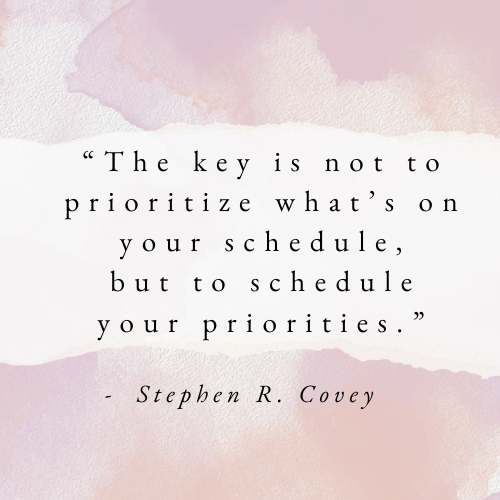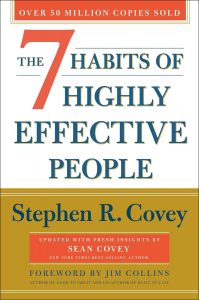Words of Wisdom from The 7 Habits of Highly Effective People: Powerful Lessons in Personal Change by Stephen R. Covey

This is hands-down one of the best books I’ve ever read on personal development. It is packed with practical life advice that anyone could (and should) apply to be an all-round better person. This is a book I will be gifting to each of my children, with the genuine hope they read it, highlight passages, make notes, and APPLY IT!
The 7 Habits of Highly Effective People is also a book I return to and re-read every few years, as I always glean a different piece of advice each time I read it – probably because different pieces of advice resonate more at different stages of life. I implore you to read this book at least once in your life – you won’t regret it!
Here are my favourite words of wisdom (so far) from this masterpiece…
- Own your choices
“But until a person can say deeply and honestly, “I am what I am today because of the choices I made yesterday,” that person cannot say, “I choose otherwise.”
2. Listen to understand
“Most people do not listen with the intent to understand; they listen with the intent to reply.”’
3. Treat people well
“Treat a man as he is and he will remain as he is. Treat a man as he can and should be and he will become as he can and should be.”
4. Visualise your end goal and work backwards from there
“Start with the end in mind. ”
5. Beware of your conditioning
“We see the world, not as it is, but as we are──or, as we are conditioned to see it.”
6. There is more than one perspective
“Two people can see the same thing, disagree, and yet both be right. It’s not logical; it’s psychological.”
7. You reap what you sow
“Sow a thought, reap an action; sow an action, reap a habit; sow a habit, reap a character; sow a character, reap a destiny.”
8. Manage your responses
“It’s not what happens to us, but our response to what happens to us that hurts us.”
9. Love is a verb
“My wife and I just don’t have the same feelings for each other we used to have. I guess I just don’t love her anymore and she doesn’t love me. What can I do?”
“The feeling isn’t there anymore?” I asked.
“That’s right,” he reaffirmed. “And we have three children we’re really concerned about. What do you suggest?”
“love her,” I replied.
“I told you, the feeling just isn’t there anymore.”
“Love her.”
“You don’t understand. the feeling of love just isn’t there.”
“Then love her. If the feeling isn’t there, that’s a good reason to love her.”
“But how do you love when you don’t love?”
“My friend , love is a verb. Love – the feeling – is a fruit of love, the verb. So love her. Serve her. Sacrifice. Listen to her. Empathize. Appreciate. Affirm her. Are you willing to do that?”
10. Work on yourself first
“If I really want to improve my situation, I can work on the one thing over which I have control – myself.”
11. Happiness is a choice
“Happiness, like unhappiness, is a proactive choice.”
12. You can feel fear and still be courageous
“Courage isn’t absent of fear, it is the awareness that something else is important.”
13. Don’t be an ineffective person
“Ineffective people live day after day with unused potential.”
14. Read
“The person who doesn’t read is no better off than the person who can’t read.”
15. Read good books
“There’s no better way to inform and expand you mind on a regular basis than to get into the habit of reading good literature.”
16. Be the solution
“Make small commitments and keep them. Be a light, not a judge. Be a model, not a critic. Be part of the solution, not part of the problem.”
17. Invest in your self-growth
“Be patient with yourself. Self-growth is tender; it’s holy ground. There’s no greater investment.”
18. Rise above your problems
“Albert Einstein observed, “The significant problems we face cannot be solved at the same level of thinking we were at when we created them.”
19. Schedule your priorities
“The key is not to prioritize what’s on your schedule, but to schedule your priorities.”
20. Be a proactive, not a reactive person
“The ability to subordinate an impulse to a value is the essence of the proactive person. Reactive people are driven by feelings, by circumstances, by conditions, by their environment. Proactive people are driven by values—carefully thought about, selected and internalized values.”
21. The different between leadership and management
“Management is doing things right; leadership is doing the right things.”
22. How to get a good job
“People who end up with the good jobs are the proactive ones who are solutions to problems, not problems themselves, who seize the initiative to do whatever is necessary, consistent with correct principles, to get the job done.”
23. Focus on the things that matter
“You have to water the flowers you want to grow.”
24. Brilliant advice
“Succeed at home first. Seek and merit divine help. Never compromise with honesty. Remember the people involved. Hear both sides before judging. Obtain counsel of others. Defend those who are absent. Be sincere yet decisive. Develop one new proficiency a year. Plan tomorrow’s work today. Hustle while you wait. Maintain a positive attitude. Keep a sense of humor. Be orderly in person and in work. Do not fear mistakes—fear only the absence of creative, constructive, and corrective responses to those mistakes. Facilitate the success of subordinates. Listen twice as much as you speak. Concentrate all abilities and efforts on the task at hand, not worrying about the next job or promotion.”
25. Write
“Just as breathing exercises help integrate body and mind, writing is a kind of psycho-neural muscular activity which helps bridge and integrate the conscious and subconscious minds. Writing distills, crystallizes, and clarifies thought and helps break the whole into parts.”
26. Focus on your attitude
“Your attitude determines your altitude.”
27. Develop your character
“There is no effectiveness without discipline, and there is no discipline without character.”
28. Trust people
“Trust is the highest form of human motivation. It brings out the very best in people. But it takes time and patience, and it doesn’t preclude the necessity to train and develop people so that their competency can rise to the level of that trust.”
29. What’s your “one thing”?
“What one thing could you do in your personal and professional life that, if you did it on a regular basis, would make a tremendous positive difference in your life?”
30. Be effective, not busy
“It is possible to be busy—very busy—without being very effective.”

